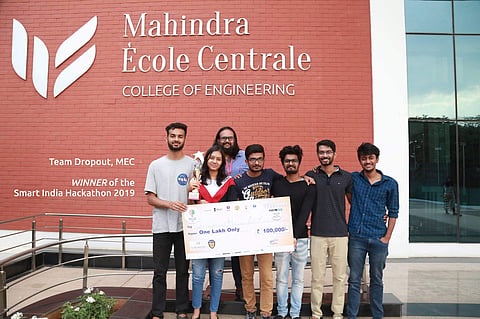

Doing Hyderabad proud, students of Mahindra École Centrale (MEC), Hyderabad — Jayesh Jain, Rahul Kumaran, Hemanth, Artika, Karthikeya and Soorya — won the Smart India Hackathon 2019. They call themselves Dropout and at this epic battle of ideas, they had to come up with a solution to a complex problem presented to them by Aurobindo Pharmaceuticals. "This win has motivated us to step out of our comfort zone and explore different things," says Jayesh who is pursuing Electrical and Electronics. So what was the problem and how did these UG BTech students come up with the solution? We'll let Jayesh answer that. Excerpts from a conversation with him:
What was the problem statement given to you?
The problem statement was to predict the relative attractive index of a country for pharma-based companies to take starting level macro decisions on where to invest, consolidate, maintain or exit. My first thought was that this could help the healthcare industry, which could reduce the lack of medicines in some countries and this got me motivated enough to work on it. We spent a good amount of time figuring out how and what data would help us predict a country's attractive index.
We scraped a lot of online resources to come up with a high-quality dataset, we used the Principal Component Analysis technique to reduce the complexity of data and then used regression models and boosting techniques to obtain highly accurate results. Figuring out what factors will affect the attractiveness of a country and then, collecting the historical data of those factors, data of almost 16 years (2000-2016), was the toughest part of the solution and also figuring out the importance of these factors.
Because working in teams involves different dynamics, how did you make sure that all the team members worked in sync?
I had a very good team with me, a team that was motivated enough to work on the problem. I just had to assign work according to their skills to make the most of the 36 hours. It was really a fascinating experience as I learnt a lot during the process of managing the team and making sure that we finish on time and be able to present ourselves.
Overall, how was your experience of participating in the hackathon?
It was a great learning experience for me in all terms, be it the technical part or managing the team. It was a bit tiring as well in the end, but despite that, we enjoyed a lot and got to learn a lot of exciting things. It is a very good platform for people to express their Ideas in terms of actual products to an audience who can help you take these ideas to the industry.
Some frequently asked questions
What is Smart India Hackathon?
It is a 36-hour-long digital product development competition where innovators are encouraged to use the latest technology to solve present-day problems
Who is it organised by?
It is organised by the Ministry of Human Resources Development, All India Council for Technical Education, Inter Institutional Inclusive Innovations Center and Persistent Systems
How do hackathons work?
As many as 35,000 teams submitted their entries for around 400 problem statements and 1,300 teams were shortlisted. Then, four teams were shortlisted per problem statement and one was declared the winner.
How many people participated this time?
More than one lakh students from about 3,000 technical institutes and 200 organisations from across India participated.
